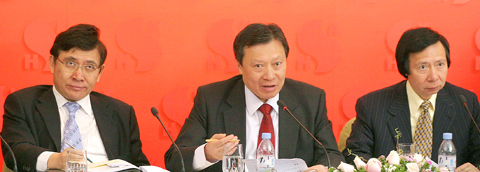Sun Hung Kai Properties Ltd (新鴻基地產), Hong Kong's biggest developer, replaced chairman Walter Kwok (郭炳湘) with his mother, seeking to end a feud that has gripped the city and split its second-richest family.
“Walter has ceased to be the chairman and chief executive of the company and has been re-designated as a non-executive director,” the company said in a filing to Hong Kong’s stock exchange. Kwong Siu-hing (鄺肖卿), 79, was appointed chairman, the company said. No chief executive officer was named.
Sun Hung Kai rose in Hong Kong trading after the decision, extending its rebound from a slump that had erased more than US$4 billion of market value. Walter, who became chairman in 1990 after his father’s death, lost a court battle yesterday to prevent a vote on his ouster, with younger brothers Thomas Kwok (郭炳江) and Raymond Kwok (郭炳聯). Walter, 57, also is suing his siblings for libel.

PHOTO: AFP
“The next question is how the company manages to deal with long-term arrangements,” said Nicole Wong, a property analyst at CLSA Ltd in Hong Kong.
The dispute has aired in court squabbles over the company that built Hong Kong’s tallest skyscraper and is the foundation of the Kwok family’s combined wealth of US$24 billion, second on Forbes Magazine’s list of Hong Kong’s richest only to Li Ka-shing (李嘉誠).
“Investors were obviously concerned about who’s going to be in charge,” Wilson Hung, an analyst at Hong Kong-based brokerage Quam Ltd, said before the announcement. “They were worried that if this keeps dragging on it will ultimately impact the company’s business.”
Sun Hung Kai rose 2 percent to HK$128.20 (US$16.42), heading for the biggest two-day gain in three weeks, as of 2:42pm in Hong Kong.
Listed on the Hong Kong stock exchange in 1972, Sun Hung Kai rode a three-decade surge in home prices to become the city’s biggest developer. Since Walter Kwok took over, the company’s value has ballooned 10-fold and the company now employs more than 27,000 people, its Web site said.
Walter Kwok said in a court filing that his brothers tried to remove him because he was suffering from mental illness. He said he doesn’t have any such disorder.
Walter, who has been on leave for personal reasons since Feb. 18, filed an injunction on May 15 to block the board vote.
Last Wednesday, he sued his brothers for libel, saying they had dubbed him a “liar,” a person of “low integrity” who made “unwise” investment decisions.
They have denied all the allegations.
Hong Kong’s Court of Appeal yesterday upheld a High Court ruling on Friday that canceled a temporary injunction blocking the meeting.
“This court simply cannot dictate to the board who should be their chairman,” Justices Rogers and Le Pichon said in Hong Kong’s appeals court yesterday.

SECURITY: As China is ‘reshaping’ Hong Kong’s population, Taiwan must raise the eligibility threshold for applications from Hong Kongers, Chiu Chui-cheng said When Hong Kong and Macau citizens apply for residency in Taiwan, it would be under a new category that includes a “national security observation period,” Mainland Affairs Council (MAC) Minister Chiu Chui-cheng (邱垂正) said yesterday. President William Lai (賴清德) on March 13 announced 17 strategies to counter China’s aggression toward Taiwan, including incorporating national security considerations into the review process for residency applications from Hong Kong and Macau citizens. The situation in Hong Kong is constantly changing, Chiu said to media yesterday on the sidelines of the Taipei Technology Run hosted by the Taipei Neihu Technology Park Development Association. With

CARROT AND STICK: While unrelenting in its military threats, China attracted nearly 40,000 Taiwanese to over 400 business events last year Nearly 40,000 Taiwanese last year joined industry events in China, such as conferences and trade fairs, supported by the Chinese government, a study showed yesterday, as Beijing ramps up a charm offensive toward Taipei alongside military pressure. China has long taken a carrot-and-stick approach to Taiwan, threatening it with the prospect of military action while reaching out to those it believes are amenable to Beijing’s point of view. Taiwanese security officials are wary of what they see as Beijing’s influence campaigns to sway public opinion after Taipei and Beijing gradually resumed travel links halted by the COVID-19 pandemic, but the scale of

A US Marine Corps regiment equipped with Naval Strike Missiles (NSM) is set to participate in the upcoming Balikatan 25 exercise in the Luzon Strait, marking the system’s first-ever deployment in the Philippines. US and Philippine officials have separately confirmed that the Navy Marine Expeditionary Ship Interdiction System (NMESIS) — the mobile launch platform for the Naval Strike Missile — would take part in the joint exercise. The missiles are being deployed to “a strategic first island chain chokepoint” in the waters between Taiwan proper and the Philippines, US-based Naval News reported. “The Luzon Strait and Bashi Channel represent a critical access

Pope Francis is be laid to rest on Saturday after lying in state for three days in St Peter’s Basilica, where the faithful are expected to flock to pay their respects to history’s first Latin American pontiff. The cardinals met yesterday in the Vatican’s synod hall to chart the next steps before a conclave begins to choose Francis’ successor, as condolences poured in from around the world. According to current norms, the conclave must begin between May 5 and 10. The cardinals set the funeral for Saturday at 10am in St Peter’s Square, to be celebrated by the dean of the College